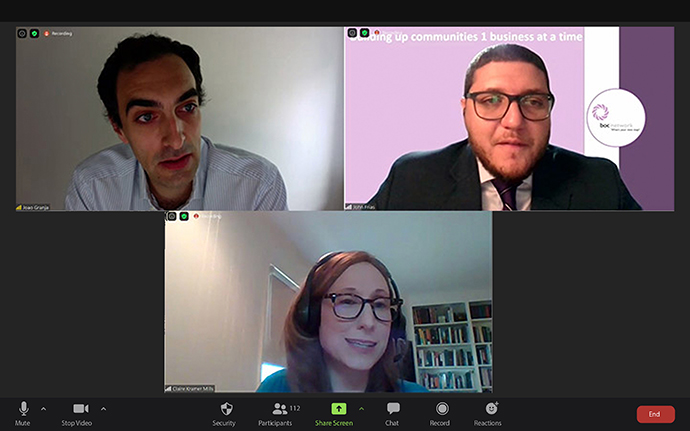Koppelman School of Business Hosts Webinar on Small Businesses and the Pandemic
September 24, 2020

Clockwise: Joao Granja, from the University of Chicago, John Frias of the Business Outreach Center Network, and Claire Kramer Mills, from the Federal Reserve Bank of New York.
The Murray Koppelman School of Business hosted a webinar earlier this week in which they dissected the effectiveness of the Paycheck Protection Program, a provision of the $2.2 trillion economic recovery stimulus that the U.S. Congress passed last spring as businesses across the country struggled in the wake of the COVID-19 pandemic.
Koppelman COVID-19 Response and Recovery Webinar
The webinar, "COVID-19 Response and Recovery for Small Businesses and Nonprofits In New York City," was the first in a series the Koppelman school is hosting in order to help "our community defeat the pandemic and plan for the post-COVID economic recovery," said Qing Hu, the newly-installed dean.
The session featured prominent industry leaders and scholars: Claire Kramer Mills, the assistant vice president and director of community development and analysis in the outreach education program at the Federal Reserve Bank of New York; Joao Granja, an associate professor of accounting at the Booth School of Business at the University of Chicago; and John Frias, who manages the Minority Business Program for the Business Outreach Center Network, a New York City nonprofit that assists low-income entrepreneurs.
Their aim was to evaluate the paycheck program's effectiveness in addressing racial equity, matching lenders with business borrowers, and helping businesses keep or re-hire their employees, among other issues.
Their key conclusions were that pre-existing funding gaps had already left Black-owned businesses with little financial cushion when entering the crisis; Black-owned businesses were often located in COVID-19 hot spots; and that the payroll program did not help facilitate better bank relationships and left significant coverage gaps.
Granja had insight on what banks could do differently to ensure that Black-owned businesses would receive more funds. He said it starts with their objectives. "We would hope that banks, including the very largest ones… at least try to prioritize minority owned businesses and female owned businesses," he said.
Frias also discussed findings from a recent survey conducted by the Minority Business Development Agency, which found that 84 percent of businesses experienced a loss of business from COVID-19, 41 percent laid off or furloughed workers that they have not been able to reinstate; and a majority were concerned about personal financial security (66 percent), maintaining client relations (63 percent), making payroll (52 percent), and paying the rent (48 percent).
"Technology is probably the biggest struggle in our communities—lack of access to technology and lack of training on technology," said Frias. "What this tells me is that more funding needs to go to…more technological training, to train businesses, not just in using work tools like Zoom, but more how to use technology to streamline their process, to reach new groups, and to increase their efficiency."
The next Koppelman webinar, "The Financial Ecosystem and Black Businesses and Entrepreneurs," will be held October 23 from 12:30 to 2 p.m.






